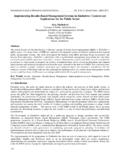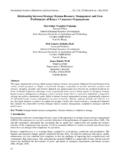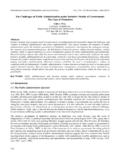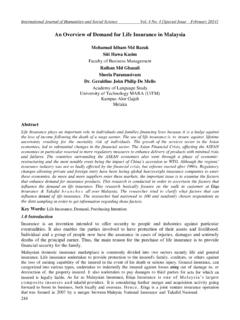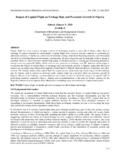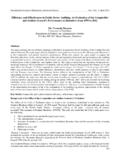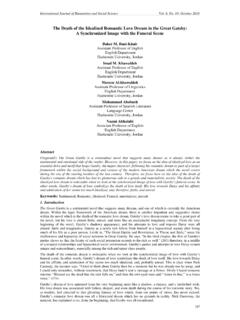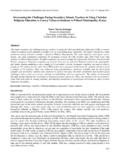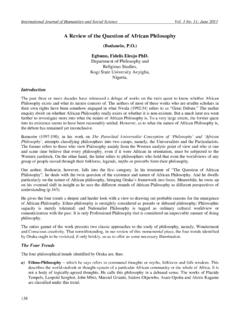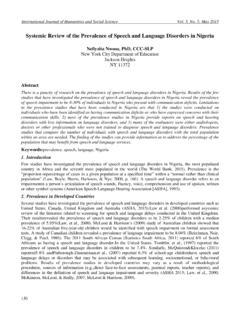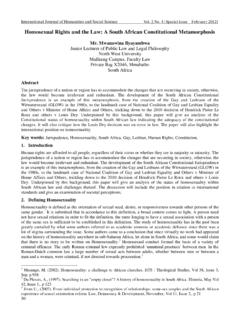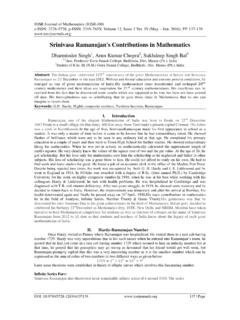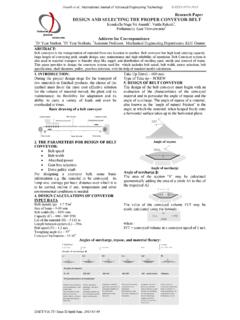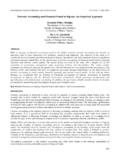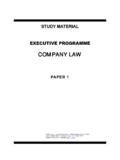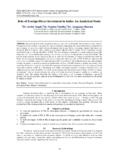Transcription of Determinants of School Effectiveness: A study at Punjab level
1 International Journal of Humanities and Social Science Vol. 2 no . 14 [ special issue - July 2012 ] 242 Determinants of School effectiveness : A study at Punjab level Prof. Dr. Farhat Saleem Vice Chancellor University of Education Lahore, Pakistan Zarghuna Naseem Assistant Professor Psychology University of Education Bank Road Campus Lahore, Pakistan Dr. Khalid Ibrahim Division of Education University of Education Lahore, Pakistan Dr Ashiq Hussain Controller Examinations University of Education Lahore, Pakistan Muhammad Azeem Assessment Expert Punjab Education Assessment System (PEAS) University of Education College Road, Township, Lahore, Pakistan Abstract The aim of this study was to find out the Determinants of School effectiveness in Pakistani context.
2 For this purpose, researchers investigated how the teachers and administrators perceive School effectiveness . A sample of 800 teachers, administrators and curriculum experts was randomly selected from the different districts of Punjab . A questionnaire was developed based on the opinions of experts and educationists about the Determinants of effective schools. A thorough review of literature was done. The questionnaire consisted of 17 Determinants of School effectiveness having 68 items. The analysis of the data revealed that all the variables were strongly interrelated with each other.
3 Researchers developed a four factor model of effective schools based on these Determinants . The participants strongly agreed that the implementation of this model will raise the quality of education in Pakistan. Key words: School effectiveness , administration, environment, professionalism, quality factors Introduction One of the primary concerns of School effectiveness Research is the question of what constitutes School effectiveness (SE). Researchers generally lack consensus on what constitutes School effectiveness .
4 School effectiveness refers to effectiveness enhancing conditions at School level (Scheerens, 2004). It includes all the contextual variables related with School such as teaching, learning, administration, students motivation and community involvement. In the early studies on School effectiveness the emphasis was on the enhancing conditions of schooling and output measures, mostly achievement of the student. The special issue on Social Science Research Centre for Promoting Ideas, USA 243 Other studies rejected this stand and stated that School effectiveness should not focus on mere academic achievement but other factors such as classroom behavior, student participation rates, and attitudes towards learning (Rutter, 1983; Sammons et al.)
5 , 1996). Coleman (1966), the pioneer in School effectiveness studies concluded that student background characteristics were far more powerful in determining student achievement than any School - level factors. In response to the results of studies of Coleman it was fond out that Schools can make a difference (Brookover, , Beady, C., Flood, P. et al. 1979) and School matters (Mortimore et al., 1988). The other researchers ( Edmonds & Frederikson, 1979; Brookover & Lezotte, 1978) in the effective schools movement also disagreed with the conclusions given by Coleman.
6 These researchers tried to investigate correlates that resulted in some schools from the low Socio-Economic-Status producing high achieving students under difficult environmental conditions. Another approach is to identify the causes of School failure. For instance, Stoll (1995): has drawn our attention to lack of vision, unfocused leadership, dysfunctional staff relationships, and ineffective classroom practices as mechanisms through which the effectiveness of schools can deteriorate (Mortimore 1997: 481).
7 Weber (1971) found out a number of characteristics for successful schools such as strong leadership, high expectations, and good atmosphere. According to Subbs (1995) the correlates of effective schools can be defined as the means of achieving high and equitable levels of student learning. It is expected that all children regardless their socioeconomic and background characteristics will get at least the essential knowledge and skill (Kirk and Jones 2004). Another view, derived from the studies done at Netherland, concluded that effective schools are those that successfully progress the learning and personal development of all of their students (ACT, 2005) is opposite to the and USA perspective of an effective School being judged merely by academic performance.
8 The definition of effective schools differs from one researcher to the next. Some researchers have focused on academic achievement of the students. Other did research concerning differences in attitudes and behavior of the students (Dodson 2005). Edmonds (1982) synthesized the research and identified some variables strongly correlated with SE such as strong administrative leadership, basic skill acquisition, high expectations for student achievement, a safe and orderly environment and frequent assessing of student achievement (Harbaugh 2005).
9 In the literature this summarizing is sometimes identified as the five-factor model of School effectiveness . Lezotte (1991) in conducting School effectiveness research found out seven correlates of effective schools which evolved the original correlates shared by Edmonds (1982) and added two variables by actual research findings: (1) instructional leadership, (2) clear vision and mission, (3) safe and orderly environment, (4) high expectations for students achievement, (5) continuous assessment of student achievement, (6) opportunity and time on task and (7) positive home- School relations.
10 Student achievements should be the basic products of effective schools. Otherwise no body can evaluate the effectiveness of School . Gaziel (1996) in a mix-methods study intended ..to compare parents , teachers , students and principles rating of the importance of School effectiveness indicators ( ), he found that parents attach much more importance to School outputs, than do the other subgroups, which supports the goal model ( ), whereas students ..attach great importance to teaching , which support the system resource model.
